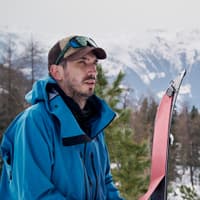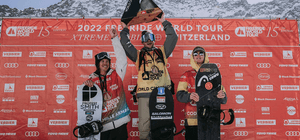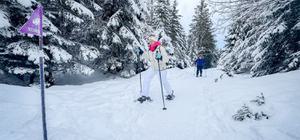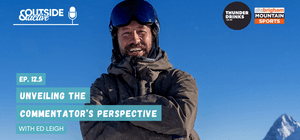10 March, 2023
As mountain folk we are lucky to share an activity that captives and consumes us in a healthy and positive manner. The need to get out in the outdoors and explore is in the bare bones of human nature and we need to protect the places that allow us to do it at all costs.

But with so many outlets for information nowadays it’s often tricky to navigate through the mire of greenwashing, fake news, false information and over-opinionated views. There’s often a lot to be said for doing your own research before making a purchase, and this is how I believe we should approach the consumerism side of snow sports in order to make better decisions when it comes to our environment.
As much as every skier and snowboarder likes to hang onto the ‘non-materialistic’ dream, the fact is that the industry is wasteful and a key contributor to its own potential downfall. In more recent years consumerism has taken hold with cheap brands trying to get in on the boom and providing outerwear and equipment at low prices……and low quality. This is fine for inclusivity in an expensive sport, but it’s what happens behind the scenes that is still rarely considered. That cheap gear doesn’t last long and will end up in landfill much sooner than quality gear that can be repaired.
We need to get back to buying quality that’s been made to last, especially in mountain sports where your equipment is your lifeline in a sometimes harsh environment. This is where us, as consumers, need to be wise in who we back but also need the brands to make a stand and not only build products that are built to last but also provide accurate and open philosophies in their processes.

There is hope, however,…..and you’ll find it in the small brands and businesses that still have their feet firmly planted in the snow……… grassroots brands are on the rise, and I’m all for it.
There are more and more of these ‘artisanal’ brands and manufacturers appearing and I think they are the key to making an impact on the longevity of mountain sports. Small brands have the flexibility to make fast changes within their production lines and have fewer moving parts that can react to the ebbs and flows of a fast-moving industry. They have the freedom to deal directly with their customers and influence their choices, which is fundamental to encouraging change. Brands need to lead the way and guide consumers into making wise and well thought through decisions.
However, It’s our responsibility to seek out these companies that are making changes and by supporting them they can find new ways to innovate.

I caught up with Leo Tsuo, owner of Colorado-based community brand Weston Backcountry. With a background in solar energy startups hes able to shed some real life light on how brands and consumers can work together.
“The balance between profitability, performance, durability, and sustainability is an incredibly complex web and as business leaders, we are faced with very hard decisions”
“Many of the decisions we make at Weston for environmental sustainability are not even newsworthy. For example, eliminating plastics from our supplier's packaging is just one of our goals and will likely never be seen by consumers but will make a big impact environmentally. This small goal requires re-engineering, re-sourcing, and additional operations, all of which adds time and cost. Doing this is unlikely to get any attention from consumers than say what goes into our board and ski materials or longer warranties to ensure a board doesn’t just get thrown away (which we do all the above). This is just one small example of how complicated a simple decision to do the right thing for the environment is not easy.
A business holds a microphone to inform and hopefully influence consumers' future behaviour toward broader issues. But the message and how it's delivered needs to be strategically crafted to ultimately encourage action. By this, I mean if consumers need to be aware of the lesser know issues threatening our environment such as how deforestation and privatisation of public lands will impact not only the environment but will impact the place they recreate in. It now becomes a more personal and relatable issue. We also should make these choices easy to act upon, such as carbon offsets for shipping or donating to specific causes that the brand also relates to”
Small brands, who tend to have a more direct relationship with their environment, are how we can make proactive contributions to our future. Often quirky and interesting in order to stand out against the giant companies, choosing to support them can allow small but much-needed contributions towards these lesser known problems and also the general health of the snow sports industry.
Leo goes on to say that “Sustainability is a spectrum. On the extreme end, we can just stop consuming, crawl into a hole and learn to hunt and gather. Not being facetious but if you consume, you are not being 100% sustainable. If that's not an option then learn to accept that "better" IS progress and it's about making changes where you can.
On the other end of the spectrum is to do absolutely nothing and take a selfish, nihilist approach that nothing you do will make a difference. Hopefully, by just reading this, you are probably more on the do something vs do nothing end of the spectrum”
“If you believe a brand to be doing more than another, then pay the extra little bit to keep that brand alive. You vote with your money and unlike your political vote, you have more than one…so use it!”
Support brands that are supporting active causes.
If there’s something to take away from this then it's to choose responsibly and to put your hard-earned money where your values lay.
Do your research on a brand, what are they doing for the greater good, and what steps are they taking to improve the environment around them and to progress the industry. Don't make decisions based on superficial reasons such as who your favourite rider is repping.
There are so many brands doing good things. Faction, Icelantic, WNDR, Sego, Weston, Capita, Niche and Zag are to name just a few.
Personally, I want the person designing/marketing/selling a board to also be out there shredding hard themselves and keeping the brand relatable on all levels and with their finger on the pulse.
There are brands out there that you won’t have heard of yet, but chances are they are cooking up wild creations and ideas that, with our support, could have a big impact.

A few key points to look for when choosing to back a brand are….
Ultimately, ask yourself, “is the brand really walking the walk”, or do they talk a good game?

I'm a photographer, creative copywriter and brand ambassador with over 14 years experience in action sports and adventure, in particular in snow sports where I cut my teeth as a competitive athlete. These valuable years taught me lessons in communication, self promotion, hard work and dedication, all of which I now apply to my creative work. It's through these experiences I have leant that even the best plans can change, so being flexible and able to think on the fly in stressful situations are skills I pride myself on.
Most recent articles by Leon Butler

Every now and then we just seem to click with certain experiences that consume us, and we then fight tooth and nail to hold onto or stay a part of whatever feeling that situation conjured up.

The winter calendar is chocka with events, races and festivals, but with spring around the corner there are a handful that really stand out. With the days getting longer and warmer, there’s more time for fun activities and good vibes, we feel these events will go a long way to ending your winter on a high.

Skiing and snowboarding are more than a pastime for a lot of people, it becomes a part of their lives that borders (sorry) on obsession. This list celebrates the creativity of athletes and filmmakers who blazed the way with unadulterated fun and balls-to-the-wall riding to some heavy hitting tunes.
Most recent articles in WINTER

I have always wanted to try snowshoeing as I love snow and I love hiking. Snowshoe trekking is a way of venturing deeper into the natural surroundings and tracing your own way through this pristine environment.

Embracing the winter chill is all about mastering the art of staying warm and cozy. As the cold season sets in, it's time to gear up and embrace the great outdoors with a collection of kit that'll keep you snug as a bug in a rug. Remember what the wise woman once said: "There is no such thing as bad weather, just bad equipment."

Ed Leigh is a notable voice in the world of action sports. Having commentated at the Olympics Ed is no stranger to the microphone. He joins Dom on this weeks episode of the Outside & Active Podcast.